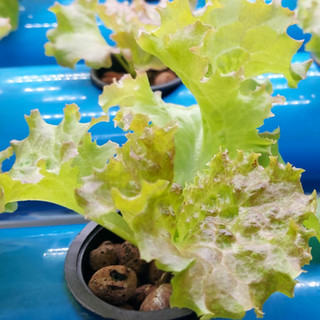Whenever we see fruits and vegetables around us we imagine the place they came from to be acres of land, huge manpower involved, water consumed, etc. However, today with the problems of ever increasing population and depleting water levels, the desire to eat chemical free food is becoming difficult to fulfil one day after another. These difficulties gave birth to our venture ‘Beyond Organic’ in September 2018.

Both of us are childhood friends and were working in Mumbai with a decent paying job before this. Having a family business background, somewhere both of us wanted to come back to Lucknow and build a business of our own, but had no idea what, when and where to begin with.
One day we both were on a call and were wondering about what all new things are happening in India which has a great potential in the years to come.
Hydroponic gardens, the term seemed quite popular in the past few months and coincidentally, we both came across it and started our research on it. We were amazed to see how we can grow premium quality, pesticides free veggies within our house without sunlight or soil, saving almost 90% of the water used in the traditional agricultural practices and how climate was not a barrier anymore to grow any vegetable all 12 months of the year.
So, what exactly is Hydroponic gardening? Hydroponics is the practice of growing plants without the use of soil. It uses specific water delivery processes to deliver nutrients directly to the roots. Instead of pulling mineral nutrients needed for growth from the ground, plants get all of their nutrition through a nutrient solution supplied to their roots. This may lead you into thinking that a lot of water must be getting wasted in this process, but actually it just keeps circulating within the system allowing plants to absorb the necessary water for active metabolism, while surplus water moves to the reservoir or storage tank to be cycled. There is no leaching, harmful runoff and there is little evaporation of water.

Hydroponics works in a variety of scenarios, from growing a small collection of herbs in a kitchen garden to numerous plants in a large-scale commercial operation. People with limited space, who can’t have an outdoor garden, find hydroponic growing especially useful.

Having read about the depleting water resources and shortage of fertile land to grow we realized that hydroponics is the sustainable way forward and the future of agriculture in the world. With new food chains willing to use farm fresh greens, healthy restaurants established every week and changing preferences of people to eat healthy and organic, we saw Lucknow an emerging market for hydroponic greens. We both decided to leave our jobs and come back to Lucknow and make this work.

But it didn't come easy especially when neither of us had that background. Temperature control, humidity, water quality, nutrition levels, pest controls, Oxygen and Carbon Dioxide levels, intensity of grow lights, light hours management, seed germination, transplanting and a large number of other things had to be taken care of. We messed up on a few things quite a lot of times and had to throw our produce each time. With a year of fascinating experimentations coupled with research, we were able to grow around 2-3 varieties of pesticide free premium quality exotic greens.

Yes, it was an achievement and a lot of learning. We saved a lot of water unlike in traditional agricultural techniques. Nutrients are sent to the reservoir, and circulated enabling plants to absorb them more effectively. A controlled environment leads to consistent and faster growth of plants. There is no outdoor contamination since no soil involved eliminating the threat of weeds and pests, resulting in better produce. Since, the system uses clean water, quality nutrients, and operates in a controlled environment, hydroponics improves the taste and quality of produce.
With the awareness in market about eating local, we continued to produce absolutely anything locally, with hydroponics. We understood that produce starts to lose its nutrients less than 24 hours after being picked, and local produce is the best way to deliver delicious vegetables to your customer. That’s another reason why local produce often tastes richer than food that has been frozen and travelled thousands of miles.

We wanted to create a separate identity of our product and so our brand name made it possible. We started creating awareness about our produce on social media and organic farmers markets organized regularly in Lucknow. Initially it took time for us to get recognition in the market but the quality and freshness of the produce which we were offering did the job for us. Today we grow around 3000 plants at a time with 14-15 varieties of hydroponic greens and herbs and around 12 varieties of micro-greens.

These two years of our establishment have been very challenging for us but at the same time it has also inspired us to work even harder in the years to come!
Hydroponics is a practice which uses zero soil, has double growth rate, about eighty percent less water is consumed, no weeds, no pesticides and enhanced nutrient value. It is undoubtedly a sustainable way of growing many plants in restricted space.







Comments